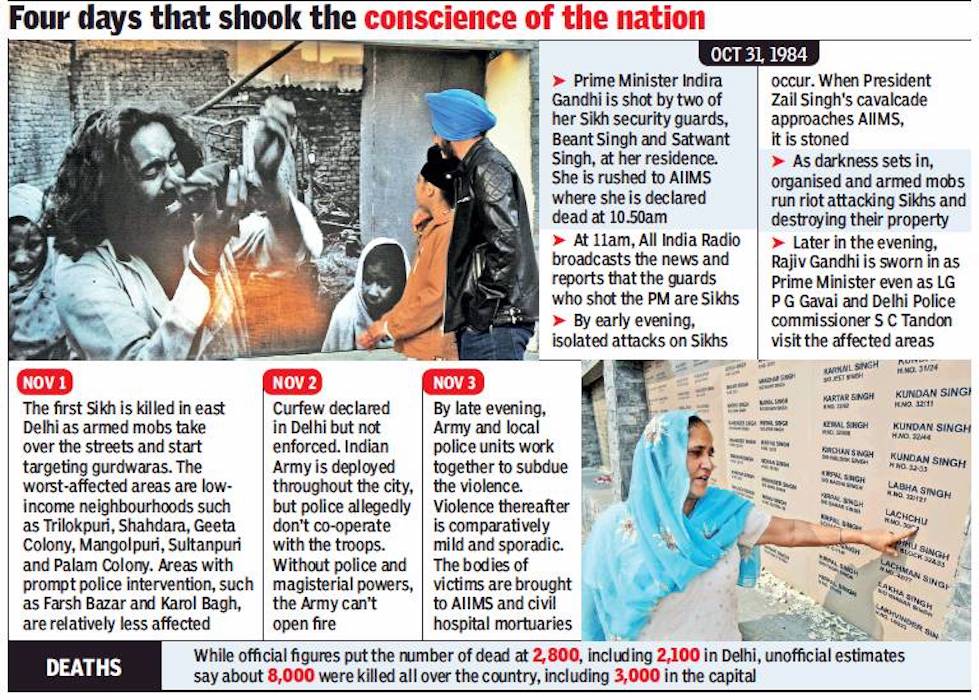1984 riots: India
This is a collection of articles archived for the excellence of their content. |
1-4 November: The riots

From: January 11, 2018: The Times of India
See graphic:
The Anti-Sikh riots of 1-4 November, 1984: a timeline
Proceedings in Delhi HC
Status in 2018
Abhinav Garg, 1984 riots: Judge’s transfer wrecks hopes, August 14, 2018: The Times of India

From: Abhinav Garg, 1984 riots: Judge’s transfer wrecks hopes, August 14, 2018: The Times of India
Many victims of the 1984 anti-Sikh riots expecting relief from court felt as if the clock had turned back. They had hoped for a decision on their plea filed in 2013 in the Delhi high court. But with Justice Gita Mittal’s transfer as chief justice of J&K high court, the bench she headed for dedicated hearing on a batch of appeals and revision petitions stood disbanded, leaving people like 80-year-old Jagdish Kaur — who was hoping for some closure after 34 years — distraught.
It means the matter that HC wanted to fast-track will have to be heard “de-novo” (once again) by a new bench, erasing the progress made since January 2017.
After taking charge as acting chief justice, Mittal had retained the riot cases she was earlier hearing and fixed every Thursday and Friday of a week for dedicated sessions. The move came after HC took note of the “delay occasioned in adjudication of these matters, which have their genesis in offences of the year 1984” and added that “certainly, a quietus needs to be brought to the entire litigation at the earliest”. But “quietus” appears far fetched for Jagdish and other widows such as Sampooran Kaur who lost their husbands or sons in the riots 35 years ago in riots that broke out in Delhi Cantt area following the assasination of Prime Minister Indira Gandhi.
Jagdish, CBI’s prime witness in the case lost her husband Kehar Singh; elder son Gurpreet and cousins Narinder Pal Singh, Raghuvinder Singh and Kuldeep Singh in the riots. Apprehensive of further delay in the appeal, she had only last month filed an application urging HC to conduct day-to-day hearing to enable an early judgment. “The appellant has withstood the test of time, in as much as it has been 34 years since the tragic and brutal murder of her family members. It is her life’s objective she may see final adjudication of the matter in her life time,” her plea said.
These appeals had reached HC after a trial court acquitted Congress leader Sajjan Kumar in 2013 but held five others guilty. While the CBI challenged Kumar’s acquittal along with the victim families, the latter also demanded enhancement of punishment to the convicted men. These were cases that were re-opened in 2005 on the recommendations of Justice Nanawati Commission leading to registration of FIRs. Speaking to TOI, Nirprit Kaur rued the “missed opportunity” for victims. Kaur, who used to travel from Chandigarh to attend the Thursday/Friday hearings, sounded crestfallen. “We are back to zero, because the matter which had been kept part heard since 2017, will now be heard once again. For Yakub Memon the court can remain open entire night but for us even twice a week we couldn’t get a proper hearing. Loss is ours,” she said.
Senior advocate H S Phoolka, who has for years spearheaded the fight for justice, admitted that the victims were very agitated and frustrated due to the delay. “They even wanted to go to the Supreme Court to stop Justice Mittal’s transfer till a judgement was delivered, but I persuaded them not to do it, because she is a good judge,” Phoolka told TOI. Download The Times of India News App for Latest City News.